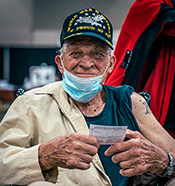Office of Research & Development |
 |


Mindfulness cultivates the habit of being present in the here and now, not focusing too much on the past or future, and acknowledging thoughts without judging them or reacting to them. (Photo for illustrative purposes only. ©iStock/electravk)
December 28, 2018
By Mitch Mirkin
VA Research Communications
A 2017 article in Psychology Today called mindfulness “the hottest new trend.”
That’s ironic, because the practice is rooted in the ancient East. But there’s no denying it has caught on big in the U.S. and other Western countries in recent years, as a tool to cope with the stressful 24/7 grind of modern life.
But is it good medicine for Veterans and others with PTSD? It might seem like a no-brainer that the answer is yes. Mindfulness involves meditative and mind-body practices that cultivate awareness of the present moment, that promote relaxation and calmness. It’s about as non-invasive as you can get. How could that be bad?
"Mindfulness helps reduce anxiety and we think it's particularly relevant for PTSD for combat Veterans..."
Researchers urge caution just the same. They aren’t ready to just assume that mindfulness is safe and beneficial for everyone. In fact, a group of mindfulness experts from several universities writing in Perspectives on Psychological Science in 2018 outlined concerns about how the benefits of the practice are sometimes hyped.
“Much of the public news media has touted mindfulness as a panacea for what ails human kind,” they wrote, “overlooking the very real potential for several different types of harm.” They cited opinions, such as from the National Center for Complementary and Integrative Health, that vulnerable patients—those with serious mental health conditions in need of real treatment—could be misled and expect more healing from mindfulness than it can actually deliver. They even cited reports in the medical literature—albeit a very limited number—of patients’ mental state getting worse after meditation.
The same authors offered ideas for building more rigor and uniformity into clinical trials of mindfulness.
VA researchers have been answering that call. Most recently, they conducted a randomized, controlled trial of mindfulness in more than 200 Veterans with PTSD. The study used a program called mindfulness-based stress reduction (MBSR), considered the gold standard of mindfulness interventions. It was compared it to a psychological treatment called present-centered therapy.

Mindfulness programs typically include exercises in mindful eating. Rather than rush mindlessly through the experience of eating an orange, for example, participants are taught to think about where the fruit came from, and to slowly and deliberately savor its appearance, scent, texture, and taste. (Photo by Mitch Mirkin)
The team assessed the results at several time points, including two months after the eight-week program ended.
Here’s how the researchers stated their findings: “Both MBSR and present-centered group therapy appear to have beneficial effects in treating PTSD in veterans, with greater improvement observed in self-reported PTSD symptoms among the MBSR group. No differences between the groups were observed on the CAPS-IV scale”—a clinician-administered questionnaire that rates PTSD symptoms.
In other words, the study didn't find any dramatic advantage to MBSR over the control therapy. Both produced modest benefits.
The results were somewhat disappointing, compared with those from an earlier pilot study. In that smaller trial, MBSR clearly outperformed present-centered group therapy for easing PTSD symptoms, even six months later.
Another VA trial, this one conducted by a Minneapolis team and published in the Journal of the American Medical Association in 2015, also saw stronger results from MBSR than from present-centered group therapy, although there too the overall effects were “modest.”
To help sort out these results, and what they mean for Veterans with PTSD, VA Research Currents spoke with two of the investigators in the forefront of studying mindfulness in VA.
Dr. Lori Davis is the associate chief of staff for research at the VA Medical Center in Tuscaloosa, Alabama. She's also a professor at the University of Alabama Health System in both Tuscaloosa and Birmingham. Dr. J. Douglas Bremner is the director of mental health research at the Atlanta VA Medical Center, and a professor at the Emory Clinical Neuroscience Research Unit at Emory University School of Medicine. Dr. Bremner is also the author of several books, some of which deal with the risks of prescription drugs.
In a nutshell, what is mindfulness all about? And how does it relate to meditation?
JDB: There's a long history in the Buddhist religion of many of the principles of mindfulness. Some people in the West have taken some of those ideas and reformulated them in a way that is usable or accessible to people from Western cultures. One of the pioneers is Dr. Jon Kabat-Zinn, at the University of Massachusetts. He started the Center for Mindfulness. We have collaborated with Dr. James Carmody, who's a psychologist and has served as the director of research for the Center for Mindfulness.
Dr. Kabat-Zinn has written several books, with titles such as "Wherever You Go, There You Are." He's [worked with] these principles of being in the moment, in the here and now; not focusing too much on things in the past and things in the future; being aware of your thoughts as they pass through; not being judgmental about your thoughts; and not letting them control your emotions or behavior.

Exercise may be useful treatment option for Veterans with PTSD

VA researcher aims to help survivors of military sexual trauma with PTSD

Study: Many veterans say their outlook has improved during COVID-19 pandemic

AHA News: The Head Is Connected to the Heart – and Can Influence Health
Mindfulness incorporates various elements, including meditation. There's something called the body scan, for example, which is going through the different parts of your body and being aware of your body.
Mindfulness helps reduce anxiety and we think it's particularly relevant for PTSD for combat Veterans, because it teaches people to be in the moment, in the present, and not to be thinking about that combat engagement [or other stressful or traumatic events].
Tell us a little about the format of MBSR as it was used in your studies.
LD: There are eight 90-minute to two-hour sessions and a half-day retreat in the curriculum. Each session builds upon the previous one, so it's important that people make a commitment to start and finish and go through the eight weeks.
The first session is an orientation. Then we get into some simple yoga to begin to focus the mind and body. There are exercises on mindful eating—for example, sampling fruit while being aware of the body and its sensations.
The Veterans learn how to do abdominal breathing with some guided breathing, focusing on the breath. There’s also the body scan practice. These are deep relaxation techniques that may overlap with other types of relaxation therapy.
Each session is followed by a homework practice. That’s also very important. Usually, an audio recording of guided meditation is given so that the Veteran can practice at home, keeping a journal. There is a period during each session when homework is discussed and shared within the group.
Given the available treatments for PTSD, like psychotherapy or medication, why would Veterans want or need mindfulness?
JDB: Medications can have side effects. Many people don't want to take medication, especially for psychiatric conditions. And psychotherapy may involve exposure to memories of traumatic events, and part of PTSD is avoidance. MBSR represents a way that they can get access to treatment without having to plow through old memories and without having to take medication.
There's also a spiritual element that people bring away from the training that I think is valuable and that is not easy to quantitate.
LD: About a third of Veterans who are recovering from posttraumatic stress discontinue a medicine or evidence-based psychotherapy prematurely because of difficulty tolerating those treatments. However, I want to emphasize that mindfulness is never intended to replace these evidence-based treatments. They are complementary and integrative health approaches. They are meant to augment or facilitate a person's recovery in combination with evidence-based treatment. We also think that many people who previously were not able to tolerate cognitive behavioral or prolonged exposure-type therapies are able to go back to them, tolerate them better, and see more success with them, once they go through the eight-week course in mindfulness.
How do you explain the mixed findings across some of the studies?
LD: The studies so far that have had shown more positive effects from mindfulness were single-site studies. Those tend to “behave” better because you have more homogeneity. You tend to have only one or two therapists, usually the same therapists throughout the whole study, so, you have less variability in how the treatment is delivered. Our recent study involved three sites. Over the course of the study, we had at least six different mindfulness therapists, two at each site, and so that adds to the variability.
We were also in a rural area--Alabama, Georgia, South Carolina—so we were working with rural Veterans, as opposed to the study in Minneapolis, where you had a northern, more urban setting. So we might have had some cultural differences as well that affected how well the intervention was accepted.
JDB: I will note that we seem to get better results on self-reported symptoms than on the clinician-administered assessment. My interpretation is that people do feel like they're getting a benefit, or they actually feel better, even if it’s not reflected on the CAPS. Ultimately, what we want to do is help our patients feel better and have a better quality of life.
LD: The beneficial effects are definitely there. I believe they are reflected better in the self-report scale. That may be because Veterans sometimes don't tolerate the clinician-administered PTSD scale. They tend to learn that if they answer "no" to a question, it gets them through this interview a lot faster. So there may be some inflation of the outcome scores, and it equals out over time between the groups. I do have confidence in the self-report scores, where they are able to openly declare what their symptoms are without the pressure of an interviewer.
JDB: The other thing is that the pilot study involved Iraq Veterans who had severe PTSD and were within one year of returning from deployment. They had early PTSD. They're more amenable, I think, to intervention. They may have had more severe symptoms, so it's easier to show an effect from the intervention. But overall, I look at the entire literature. There's no study that shows mindfulness doesn't have any benefit at all.
Based on the studies to date, what have we learned about the feasibility and acceptability of MBSR or other mindfulness interventions among Veterans?
LD: We know it is feasible. I'm not totally sold that it's acceptable in its current format for rural, deep South Veterans, because we did have quite a large dropout. About a third dropped out, in our study, compared to 10 percent in the Minneapolis study. So, we do need to understand better in future studies about cultural diversity, and perhaps develop strategies to address that. For example, perhaps we could provide a pre-commitment sampling of mindfulness to help Veterans in our area have a better understanding of it before they commit to the practice.
Given the literature to date, should mindfulness be part of clinicians' toolboxes for treating PTSD?
JDB: I would say that mindfulness-based stress reduction is another tool that VA clinicians can use. I think that there's a place for mindfulness classes that are associated with VA mental health clinics. Some Veterans are attracted to the concepts and they can learn things they can use in their daily life, and the side effects are minimal. We had some concerns about doing mindfulness in Veterans—maybe people wouldn’t grasp the concept, or they might dissociate. But we haven't had any real negative effects. So, I think it should be made available for Veterans who choose to attend.
LD: I agree. The limitation is that not all VAs are offering mindfulness groups, so it may not be immediately available in all of the community-based clinics, especially in rural areas. I would like to point out that there is a Mindfulness Coach app that's available on the National Center for PTSD website. It has nine guided audio sessions, self-guided versions. So Veterans can be introduced to mindfulness until they can find a group to participate in face-to-face.
Are there groups outside VA that Veterans can take advantage of?
LD: Absolutely, and the cost is usually very low. Sometimes classes are offered for free at community centers. I think it's very much worth looking around the community for groups that are using mindfulness meditation.
Are there any resources you can offer VA clinicians who would like to learn more?
LD: During this research, we developed a manual. It’s very hard to get your hands on a good eight-week manual. If any VA clinicians want to get in touch with us, we will share our eight-week manual that gives session-by-session guidance. It's customized for Veterans as well as for PTSD. Most previous manuals were more generic. We consulted with many experts to help customize it.
JDB: Here’s one example of how we've specified it for Veterans: All soldiers go through rifle training. They learn to focus on their breath, because as you breathe in and out, there could be minute movements of the rifle that affect your aim. We invoke that analogy when we teach the mindfulness participants how to stay focused on their breath. So we’ve tried to have it be in a language that is accessible and familiar for Veterans.
LD: There is one Veteran who was in the study, who went through the mindfulness sessions, and still comes back years later saying that he uses the principles when he's getting triggered, which would commonly lead to aggressive, threatening behavior. He learned to focus on his breath, attend to his body, and say, "Let it go." Rather than avoid the negative feeling, he's noticing it and then letting it go. So the Veterans find messages in the manual that work for them. Each patient goes through it individually and finds and makes use of the practice and puts it into their own words.
JDB: Mindfulness may not be a cure for PTSD, but this is a chronic condition, and the more tools we can give Veterans to help them in their day-to-day life, especially to avoid violent outbursts, the better.
Do some researchers from these studies end up using mindfulness themselves?
LD: I'll be the first to say that I do. It’s important to note that you do not have to meditate in a dark room on a cushion, even though that helps. You can meditate anywhere, anyhow for a few minutes—including a VA executive meeting, for example. Let’s say you’re dealing with a high-stress topic, and pressure is building. Take a minute or two and meditate. Go back to the breath. Be aware of the current state and then re-attend to the meeting. This meditation is anywhere, anytime, all day.
JDB: I've read Jon Kabat-Zinn's books, and I have invited these principles into my life. It’s a way of approaching the world. This is not just for people with psychiatric disorders. I think it's useful for everyone.
VA Research Currents archives || Sign up for VA Research updates